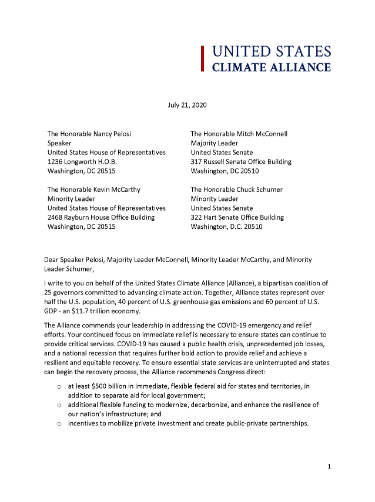Home / U.S. Climate Alliance Outlines Federal Stimulus Recommendations

Tags
- Letter
U.S. Climate Alliance Outlines Federal Stimulus Recommendations
July 21, 2020
COVID-19 has caused a public health crisis, unprecedented job losses, and a national recession that requires further bold action to provide relief and achieve a resilient and equitable recovery. The U.S. Climate Alliance has outlined actions that can ensure essential state services are uninterrupted and states can begin the recovery process. Specifically, we recommend that Congress direct:
- at least $500 billion in immediate, flexible federal aid for states and territories, in addition to separate aid for local government;
- additional flexible funding to modernize, decarbonize, and enhance the resilience of our nation’s infrastructure; and
- incentives to mobilize private investment and create public-private partnerships.
The current crisis demands a comprehensive, strategic, and equitable response. By preserving core state and local government services, revitalizing our nation’s critical infrastructure, mobilizing private investment, and creating family-sustaining jobs, governors outline how to do this in a way that puts us on a path to economic recovery and addresses the ever-growing climate crisis.
About the Alliance
Launched in 2017 by the governors of Washington, New York, and California to help fill the void left by the U.S. federal government’s withdrawal from the Paris Agreement, the Alliance has grown to include 24 governors from across the U.S. representing approximately 60 percent of the U.S. economy and 55 percent of the U.S. population. Governors in the Alliance have pledged to collectively reduce net greenhouse gas emissions by at least 26-28 percent by 2025, 50-52 percent by 2030, and 61-66 percent by 2035, all below 2005 levels, and collectively achieve overall net-zero greenhouse gas emissions as soon as practicable, and no later than 2050.
The Alliance’s states and territories continue to advance innovative and impactful climate solutions to grow the economy, create jobs, and protect public health, and have a long record of action and results. In fact, the latest data shows that as of 2023, the Alliance has reduced its collective net greenhouse gas emissions by 24 percent below 2005 levels, while increasing collective GDP by 34 percent, and is on track to meet its near-term climate goal of reducing collective greenhouse gas emissions 26 percent below 2005 levels by 2025.
###